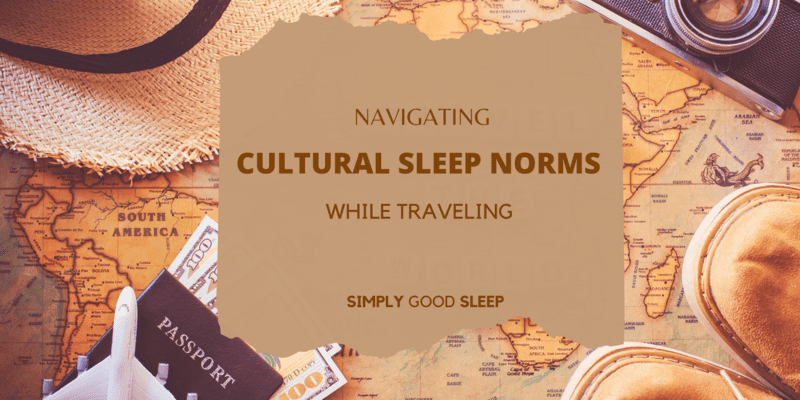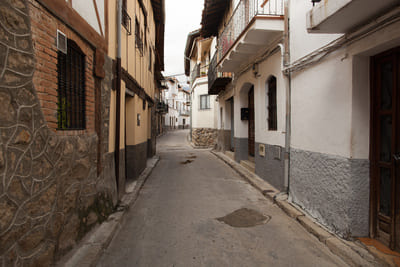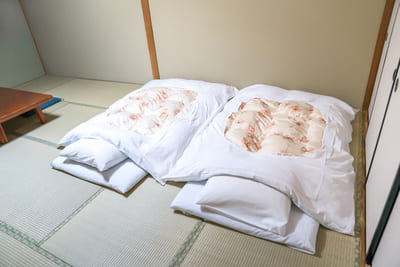
Embarking on a journey to distant lands, immersing oneself in diverse cultures, and navigating unfamiliar landscapes – the essence of travel is a tapestry woven with experiences that extend far beyond sightseeing. Yet, one aspect often overlooked in the excitement of exploration is the profound impact of cultural sleep norms on our well-being during these adventures. In this post, we delve into the intricate dance between travel and sleep, focusing on the art of navigating cultural sleep norms while traveling. Whether you’re a business traveler, seasoned globetrotter, a first-time explorer, or a digital nomad on a perpetual quest for new horizons, this guide is designed to unravel the complexities of sleep in diverse cultural contexts.
Join us on this expedition through sleep customs, cultural sensitivity, and practical strategies, as we equip you with the tools to not just endure but embrace the rich diversity of sleep experiences that travel unfolds. Let’s embark on a journey where cultural awareness becomes the key to unlocking a peaceful night’s rest, transforming each destination into a sanctuary for rejuvenation and discovery.
Understanding Cultural Sleep Practices
Welcome to the fascinating world of cultural sleep practices, where bedtime is not just a personal routine but a reflection of deep-rooted societal norms. As you embark on your global adventures, understanding how different cultures approach sleep is crucial for a seamless and enriching travel experience.
1. Siestas, Afternoon Naps, and Midday Breaks
Picture yourself strolling through the charming streets of Seville, Spain, or the bustling markets of Mexico City. What you may notice is not just the architectural beauty or vibrant street life but the cultural phenomenon of siestas. In many Mediterranean and Latin American countries, the afternoon siesta is not merely a nap. It is a cherished tradition ingrained in the fabric of daily life. Businesses close, streets quiet down, and locals retreat for a brief respite from the day’s hustle.

Understanding the significance of siestas goes beyond adjusting your own sleep schedule. It is about embracing the cultural rhythm and recognizing that this midday break is not a sign of laziness but a celebration of balance. Consider adapting your itinerary to align with local customs. Plan your sightseeing in the morning, take a siesta in the afternoon, and savor the lively evenings that follow.
2. Late-Night Activities and Socializing
Now, let’s delve into the vibrant nightlife cultures around the world. In places like Tokyo, New York, or Madrid, the city comes alive as the sun sets. Late-night activities and socializing are deeply embedded in the social fabric, shaping the local sleep practices. Whether it’s tapas in Spain, karaoke in Japan, or rooftop cocktails in New York, embracing these nocturnal adventures is a gateway to understanding the heartbeat of a city.
However, late-night socializing can pose a challenge for those accustomed to an early bedtime. The key is not to resist but to adapt. Consider adjusting your sleep schedule gradually before your trip, allowing your body to get used to the local rhythm. This way, you can savor the richness of nighttime activities without sacrificing your well-being.
3. Varied Sleep Schedules and Expectations
As you traverse diverse cultures, you’ll encounter varied sleep schedules and expectations that challenge the conventional 9 to 5 routine. In some Asian cultures, it’s not uncommon for workdays to extend into the evening, blurring the lines between professional and personal time. Flexibility and adaptability may have to become your allies in such environments, where the conventional concept of a fixed bedtime may be more fluid.
To navigate these nuances successfully, engage with locals and observe their daily routines. Strike up conversations about their work-life balance and sleep habits. By doing so, you not only gain valuable insights into their culture but also discover strategies to harmonize your own schedule with the local flow.
In essence, understanding cultural sleep practices is not about conforming but about appreciating the unique tapestry of each destination. Embrace the siestas, join the nocturnal festivities, and flow with the varied sleep rhythms around the world. Your journey is not just about the places you visit but the cultural experiences you immerse yourself in, including the way each destination sleeps.
Challenges Faced by Travelers
Embarking on a journey to foreign lands is a thrilling adventure. But, it comes with its own set of challenges, such as adapting to new and diverse sleep norms. Let’s explore the potential difficulties that travelers might encounter. Let’s also delve into strategies for mitigating these challenges, ensuring a more restful and enriching travel experience.
1. Disruptions to Circadian Rhythm
One of the primary challenges faced by travelers is the disruption to their circadian rhythm, the internal body clock that regulates sleep-wake cycles. Crossing time zones, jet lag, and adjusting to new daily routines can throw this delicate balance into disarray. The result? Fatigue, insomnia, and a general sense of disorientation.
Mitigation Strategies:
- Gradual Adjustments: If possible, adjust your sleeping schedule a few days before your trip. This can be done by gradually shifting your time to go to bed and time to wake up to align with the destination’s time zone, allowing your body to adapt more smoothly.
- Natural Light Exposure: Spend time outdoors in natural light upon arrival. Sunlight helps regulate your circadian rhythm and signals to your body that it’s time to be awake.
- Strategic Napping: Short naps can help combat fatigue, but timing is crucial. Aim for a nap in the early afternoon to avoid interfering with nighttime sleep.
2. Impact on Overall Well-being and Travel Experience
Poor sleep quality can have a cascading effect on your overall well-being and, consequently, your travel experience. From decreased energy levels to a compromised immune system, the repercussions of sleep deprivation can put a damper on even the most exciting adventures.
Mitigation Strategies:
- Prioritize Sleep Hygiene: Regardless of your location, maintain good sleep hygiene practices. Create a comfortable sleep environment, limit screen time before bed, and stick to a consistent bedtime routine.
- Hydration and Nutrition: Pay attention to your hydration and nutrition, as they play crucial roles in regulating sleep. Stay well-hydrated and be mindful of your meal times, adjusting them to align with local customs.
- Physical Activity: Incorporate moderate physical activity into your daily routine. Exercise, such as tai chi or yoga, can help improve sleep quality and alleviate some of the stress associated with travel.
3. Strategies for Mitigating Challenges
Travelers need a toolkit of strategies to navigate the challenges posed by diverse sleep norms. Here are practical approaches:
- Mindful Planning: Research the sleep customs of your destination before departure. Knowing what to expect allows you to plan your activities and sleep schedule accordingly.
- Adaptive Sleep Aids: Consider using sleep aids judiciously, such as melatonin supplements, or relaxation techniques, to help reset your internal clock and induce sleep when needed. Always exercise caution and consult with your healthcare provider before using any supplements.
- Flexibility and Patience: Cultivate a mindset of flexibility and patience. Understand that adapting to new sleep norms is part of the travel experience, and allow yourself the time to acclimate.
In the midst of these challenges lies an opportunity for personal growth and cultural understanding. By recognizing and proactively addressing the potential hurdles to restful sleep, you empower yourself to fully embrace the richness of your travel adventures. After all, a well-rested traveler is better equipped to savor the wonders of new cultures and create lasting memories. So, pack your resilience, adjust your mindset, and embark on your journey with an open heart and a well-rested spirit. Safe travels!
Cultural Sensitivity and Awareness
As you embark on your global escapades, one of the keys to a harmonious travel experience lies in navigating cultural sleep norms while traveling with sensitivity and awareness. Sleep, often considered a private affair, becomes a window into the values and customs of a community. Let’s explore how cultivating cultural sensitivity can enhance not only your rest but also your connections with locals.
Cultural Etiquette in Sleep-Related Matters
Imagine staying in a quaint village in India where sharing a bed is a gesture of warmth and hospitality. Conversely, in certain Scandinavian cultures, personal space is highly valued, and the idea of sharing a bed may be met with discomfort. Understanding and respecting these cultural nuances is vital.
In cultures where sleep is a communal experience, reciprocate the gesture gracefully. Grasp the unspoken rules – whether it’s removing your shoes before entering a sleep space or adhering to specific bedtime rituals. Being attuned to these details showcases your respect for local customs and fosters a positive cultural exchange.
Ways to Show Consideration for Cultural Practices
Respect is a universal language, and it extends to the realm of sleep. While you may be tempted to bring your home habits with you, adapting to the local sleep ethos is an integral part of cultural immersion. Start by researching common sleep practices before your trip to familiarize yourself with expectations.
Suppose you find yourself in a country where daytime noise is considered a norm. In that case, embracing the rhythm rather than resisting it can lead to a more rewarding experience. Similarly, being mindful of cultural norms regarding public displays of affection, noise levels, or even attire in sleep spaces demonstrates your commitment to cultural understanding.
Cultural Sleep Etiquette
In the intricate dance of navigating cultural sleep norms while traveling, understanding and adhering to cultural sleep etiquette becomes an essential choreography for fostering respect and harmony. Let’s explore the nuances of etiquette, providing valuable insights into the unspoken rules that connect travelers with the cultural landscapes they traverse.
Respecting Quiet Hours
Many cultures observe specific quiet hours, especially during the night. Whether it’s the tranquility of a quaint village or the hushed tones of a bustling city, acknowledging and adhering to these designated quiet periods showcases cultural sensitivity. It ensures that your quest for exploration harmonizes with the local rhythms, fostering a sense of mutual respect.
Adapting Sleepwear Choices
Consider the cultural norms surrounding sleepwear, especially in shared accommodations or homestays. In some cultures, modest sleep attire is appreciated, while in others, casual comfort may be more widely accepted. Adapting your sleepwear choices demonstrates an awareness of local customs.
Acknowledging Communal Spaces
Respect for communal sleep spaces, such as guesthouses or shared accommodations, is paramount. Mindful behaviors like minimizing noise, using headphones, or dimming personal lights contribute to a shared environment where everyone can enjoy the benefits of rest without disrupting others.
Understanding Bedtime Rituals
Explore the cultural intricacies of bedtime rituals, including any practices that precede sleep. Whether it’s a traditional bedtime prayer, meditation, or a communal gathering, acknowledging and understanding these rituals enhances your connection to the local culture and deepens your appreciation for the diverse ways in which sleep is woven into daily life.
Communicating Openly
When in doubt, communication becomes the bridge between cultural differences. Engage in open conversations with hosts, fellow travelers, or locals to seek guidance on sleep-related customs. Your willingness to learn and adapt fosters a spirit of cultural exchange and opens doors to meaningful connections.
Sleep-Friendly Destinations
In our exploration of navigating cultural sleep norms while traveling, we unveil some of the many wonderful global destinations that beckon with promises of restful nights and cultural enrichment. These locales, characterized by their commitment to promoting healthy sleep, offer a sanctuary for weary travelers seeking an immersive and tranquil experience.
Rural Retreats in Tuscany
Picture a Tuscan landscape where vineyards sprawl under the golden sun, and time seems to slow down. Tuscany‘s idyllic rural retreats not only embrace the famed siesta but also provide a serene haven where the embrace of nature enhances the quality of sleep.

Japanese Ryokans in Kyoto
Kyoto’s traditional ryokans offer more than just accommodation; they provide an immersion into the refined art of Japanese hospitality. With tatami mat flooring, futon beds, and peaceful gardens, these establishments create an ambiance that respects both cultural traditions and the rejuvenation of the weary traveler.

Wellness Retreats in Bali
In the lush landscapes of Bali, wellness retreats harmonize with the island’s spiritual aura. Yoga sessions, holistic spa treatments, and eco-friendly accommodations contribute to an environment where sleep becomes a natural extension of the journey towards well-being.
By exploring these sleep-friendly destinations, you not only encounter the cultural nuances that shape local sleep practices but also discover havens where the essence of travel intertwines seamlessly with rest and rejuvenation.
Sleeping Well Amidst Cultural Differences: Practical Tips for Travelers
In the ongoing journey of navigating cultural sleep norms while traveling, practical tips become invaluable tools for ensuring a good night’s rest while immersing oneself in diverse cultural landscapes. This section unveils a treasure trove of actionable advice, equipping travelers with the know-how to embrace cultural differences without compromising on the quality of their sleep.
Strategic Accommodation Choices
Choose accommodations that align with your sleep preferences. If you value tranquility, consider lodgings in quieter neighborhoods. On the other hand, if you seek vibrant energy, choose accommodations closer to the heart of the action. Your choice of lodging sets the stage for a more comfortable sleep experience.
Invest in Quality Sleep Accessories
Pack travel-friendly sleep accessories to create a familiar sleep environment. Portable items like a comfortable neck pillow, an eye mask, and earplugs can significantly enhance your ability to rest well, regardless of the cultural nuances surrounding you. Whether it’s the hum of a bustling city or the tranquility of a countryside, control the auditory landscape with relaxing music, personalized soundscapes, or white noise apps. Travel-sized essential oils or linen sprays can infuse your sleep space with familiar fragrances, transforming your surroundings into a haven of relaxation.
Adaptive Sleep Schedules
Slowly and gradually adjust your sleeping schedule to align with the local time zone before you arrive at your destination. This approach minimizes the impact of jet lag, allowing your body to acclimate more smoothly to the cultural rhythms awaiting you.
Cultural Awareness and Flexibility
Cultivate cultural awareness and flexibility in your approach to sleep. Understand that different cultures may have varying attitudes toward sleep duration, nap times, and nocturnal activities. Embrace these differences with an open mind, knowing that your ability to adapt enriches your overall travel experience.
Mindful Consumption
Be mindful of your consumption, especially of stimulants like caffeine and alcohol. These substances can influence your sleep quality, and understanding how they interact with local customs ensures that you can partake in cultural experiences without sacrificing your rest.
Create a Personal Sleep Sanctuary
Transform your sleeping space into a personal sanctuary, regardless of where you are. This might involve arranging your belongings in a familiar way, incorporating comforting scents, or even playing soothing sounds. Crafting a sleep sanctuary enhances your ability to relax and unwind amidst cultural diversity.
Conclusion
Congratulations on making it this far in our comprehensive guide on how to navigate cultural sleep norms while traveling! Remember that your journey is not just about the destinations you visit but the stories you collect along the way. Each piece of advice, study, or personal account contributes to the mosaic of your travel experience. Embrace the opportunity to learn, adapt, and connect with the diverse cultures that make our world a tapestry of unique sleep practices.
In the spirit of community, we invite you to share your own insights, questions, and discoveries. Whether you’re a seasoned traveler with wisdom to impart or a curious explorer seeking guidance, let this space be a forum for enriching discussions on the intersection of sleep, culture, and wanderlust.
Safe travels, and may your journey be as restful as it is culturally enriching!

2 Responses
Hi
What a great read! I never thought about how different sleep customs could affect my travels. The tips on adjusting to siestas in Spain or late nights in Tokyo are really helpful. I also liked the advice on making a sleep-friendly travel kit with items like earplugs and eye masks. This will definitely make my trips more comfortable. Thanks for sharing such useful information! Can’t wait to try these tips on my next adventure. Thank you.
Kind Regards
Richard
Hi Richard, we’re thrilled you found the post helpful! It’s amazing how much local sleep customs can enrich our travel experiences. Embracing siestas in Spain or the vibrant nightlife in Tokyo truly lets us dive into the culture. We’re glad the tips on creating a sleep-friendly travel kit resonated with you. Those small adjustments can make a big difference in comfort. Safe travels on your next adventure, and may your journey be filled with restful nights and exciting discoveries! 🌍😴✨ Feel free to share your experiences or any new tips you discover along the way!